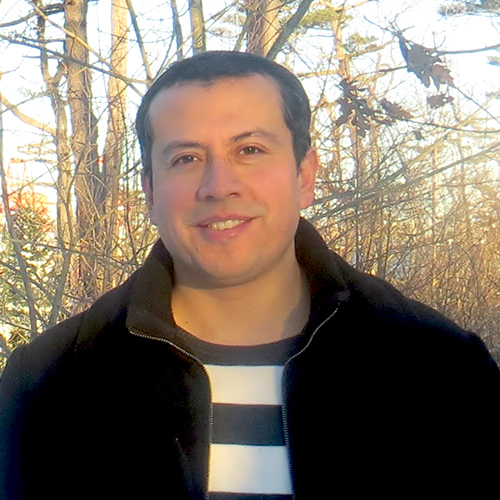Mauricio Castrejon Mendoza
ABOUT
 Mauricio Castrejón. Mexican; Marine biologist; PhD candidate. I am a former Associate Researcher at the Charles Darwin Research Station (2004-2008) and consultant for World Wildlife Fund (2008-2010) at the Galapagos Islands, Ecuador. Currently, I am a doctoral candidate at the Interdisciplinary PhD Program of Dalhousie University, Canada, and consultant for the Conservation International-Eastern Tropical Pacific Seascape Program (ETPS). I specialize in the social-ecological assessment and management of small-scale fisheries in marine protected areas, with special relevance on the impact of diverse human and climatic drivers in the co-governance of diverse small-scale shellfisheries in Latin America.
Mauricio Castrejón. Mexican; Marine biologist; PhD candidate. I am a former Associate Researcher at the Charles Darwin Research Station (2004-2008) and consultant for World Wildlife Fund (2008-2010) at the Galapagos Islands, Ecuador. Currently, I am a doctoral candidate at the Interdisciplinary PhD Program of Dalhousie University, Canada, and consultant for the Conservation International-Eastern Tropical Pacific Seascape Program (ETPS). I specialize in the social-ecological assessment and management of small-scale fisheries in marine protected areas, with special relevance on the impact of diverse human and climatic drivers in the co-governance of diverse small-scale shellfisheries in Latin America.
RESEARCH
The main objective of my doctoral thesis is to conduct a social-ecological and spatially explicit assessment of the spiny lobster fishery from the Galapagos Marine Reserve to determine how red and green spiny lobster stocks (Panulirus penicillatus and P. gracilis) and three local small-scale fishing communities responded to the social-ecological impacts produced by diverse human and climatic drivers between 1997 and 2011, and the potential management implications of the fishing and biological patterns identified to improve the governability of the Galapagos spiny lobster fishery. The results of this thesis will be timely to inform the first comprehensive and integrated management effectiveness evaluation of the GMR´s marine zoning, which is being conducted by the Galapagos National Park Service with the support of several local and international NGOs, including WWF-Galapagos Program, Conservation International and Charles Darwin Foundation.
PLACE
The Galapagos Islands are located in the Eastern Tropical Pacific about 960 km of mainland Ecuador. This volcanic archipelago is worldwide recognized for being located at the convergence of three major seasonally varying current systems: the Peruvian, Cromwell and North Equatorial oceanic currents, as well as by the strong influence that “El Niño” has over the abundance and distribution of marine species and habitats. Such particular oceanographic and geological features influenced the origin of unique terrestrial and marine ecosystems composed by a high proportion of terrestrial and marine endemic species. Such features inspired the naturalist Charles Darwin to conceive his famed Theory of Evolution by Natural Selection following his visit to the archipelago in 1835, and were responsible for the designation of the Galapagos Islands as World Heritage site by UNESCO in 1978. Currently, there are approximately 30,000 people habitually inhabiting 3% of the total land area of Galapagos. The human population lives in three main districts: Santa Cruz (58.7%), San Cristobal (32%) and Isabela (9.3%).
A high diversity of marine species is commercially harvested. The most important are the sea cucumber (Isostichopus fuscus) and spiny lobster (Panulirus penicillatus and P. gracilis), which are caught in sub-tidal rocky habitats through hookah and skin diving by more than 400 fishers, who are organized in four fishing cooperatives. A co-management system was established in March 1998 to face several political and socio-economic challenges that put in risk of losing the unique and extraordinary terrestrial and marine biodiversity of the archipelago. Unfortunately, the implementation of a co-governance system in combination with a marine zoning have not been enough to achieve the sustainability of fishery resources and local artisanal fishing sector. In this context two main questions arises: (1) Why co-management and marine zoning have not been effective management tools to ensure Galapagos small-scale fisheries sustainability?; and (2) What actions should be taken to improve fisheries governance?.
KEY PUBLICATIONS
Castrejón M, Defeo O (In press) Co-governance of small-scale shellfisheries in Latin America: the role of institutional adaptive capacity to cope with climatic and human drivers of change. In: Jentoft S, Chuenpagdee R, (eds) Governing the governance of small-scale fisheries. Springer, New York.
Defeo O, Castrejón M, Gutiérrez NL, Pérez-Castañeda R, Folke C, Castilla JC (2014) Shellfisheries co-management in Latin America: a critical assessment derived from long-term case studies. Fish and fisheries. DOI: 10.1111/faf.12101.
Castrejón M, Defeo O, Reck G, Charles A (2014) Fishery science in Galapagos: From a resource-focused to a social-ecological systems approach. In: Denkinger J, Vinueza L (eds) The Galapagos Marine Reserve: a dynamic social ecological system. Springer, New York, p 159-186.
Defeo O, Castrejón M, Ortega L, Kuhn AM, Gutiérrez NL, Castilla JC (2013) Impacts of climate variability on Latin American small-scale fisheries. Ecology & Society 18 (4): 30.
Castrejón M, Charles A (2013) Improving fisheries co-management through ecosystem-based spatial management: The Galapagos Marine Reserve. Marine Policy 38: 235-245.
Wolff M, Schubauer A, Castrejón M (2012) A revised strategy for the monitoring and management of the Galapagos sea cucumber. International Journal of Tropical Biology 60 (2): 539-551.
Ramírez J, Castrejón M, Toral V (2012) Mejorando la pesquería de langosta espinosa de la Reserva Marina de Galápagos. World Wildlife Fund, Ecuador, 278 pp.
Castrejón M (2011) Co-manejo en la Reserva Marina de Galápagos: tendencias, retos y perspectivas de cambio. Fundación Charles Darwin and Kanankil/Plaza y Valdez, México, 416 pp.
Defeo O, Castilla J, Castrejón M (2009) Pesquerías artesanales de invertebrados en América Latina: paradigmas emergentes de manejo y gobernanza. Foro Iberoamericano de los Recursos Marinos y la Acuicultura II: 89-117.


